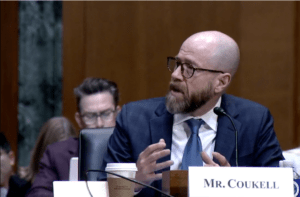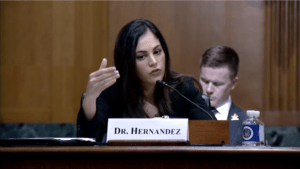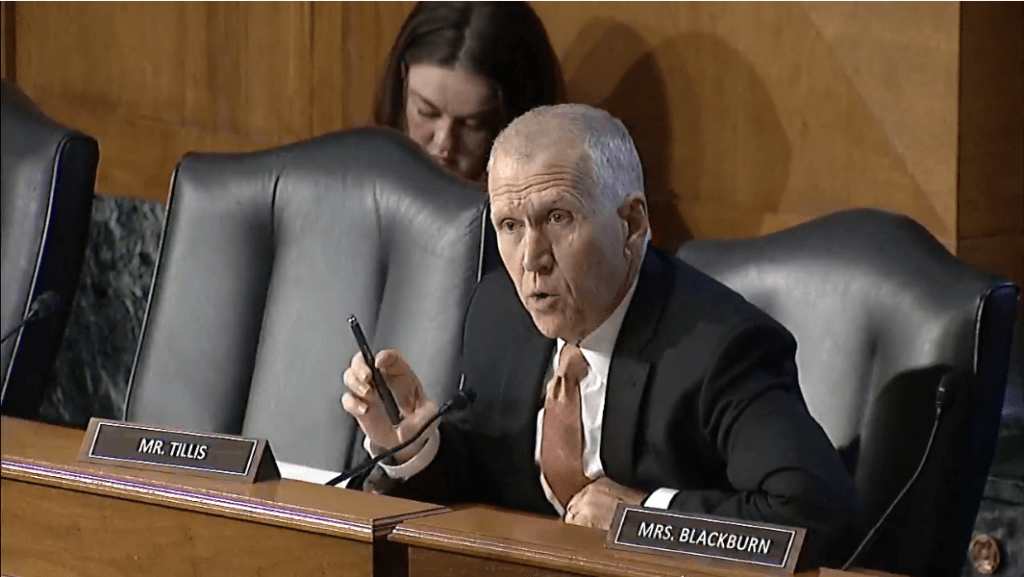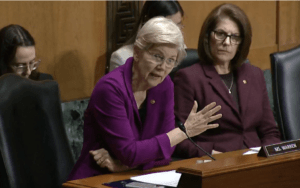Senator Thom Tillis (R-NC) wasn’t the only one in the Senate Finance Committee hearing on drug shortages on Tuesday who said the U.S. needs a CHIPS Act for generic drugs. He had company.
“I voted for the CHIPS Act, and the reason I voted for that is because we need supply chain resiliency in the semiconductor space. I think there is an analog here about how we bring manufacturing of low-priced drugs back to the United States,” Sen. Tillis said during the Q&A period. The CHIPS and Science Act is a $280 billion funding program of which most of the money is geared towards tax incentives for chip fabricators to make semiconductors domestically rather than in Asia. “I can see regulatory burdens being one way to solve this, and a lack of tax incentives is a problem. What can we do?” he asked.
Jason Westin, one of the four witnesses, and an M.D. at the Anderson Cancer Center in Houston, said, “In thinking of semiconductors, not having access to generic drugs in some ways is a national security issue.” [Testimony]
Marta Wosinska, Senior Fellow at the Schaeffer Initiative on Health Policy at The Brookings Institution said Tillis’ example of a CHIPS Act for pharmaceuticals was “a great example” of how reshoring supply chains can be done. [Testimony]
“But you are talking about thousands of products. The framework is good. But you need to layer on top of that how the government will prioritize what is critical,” she warned. “For example, cancer drugs are not on the essential medicines list. You need to think of nearshoring and you need to think of full supply chains. If you moved an API facility to the U.S. but all the key starting materials (KSM) come from China, what problem did you solve? You have to be strategic before you take steps taken in the CHIPS Act.”

CivicaRx is a non-profit that contracts with local labs to make essential generic drugs that face constant supply shortages.
Allan Coukell, Senior Vice President of Public Policy at Civica Rx, a five-year-old non-profit generic drug company created by US health systems and philanthropies to address drug shortages, said he shared Sen. Tillis’ desire “for a strong domestic base for pharmaceuticals. It’s helpful to solve for long-term geopolitical risk but if you are thinking of just shortages, then you need a robust infrastructure to handle the finished product. You can do that, but at today’s prices very few labs can invest in the capacity to fix that,” he said, adding that he already knows which drugs will go into shortage. The main problem is that the prices of generic drugs are so low that few labs here will make them because it costs too much to build a lab to handle those critical drugs in perennial supply shortage. “But you can build one for around $3 million or so per drug…and the government can help. That’s a cost-effective insurance policy right there.” [Testimony]
From the Committee, Senator Elizabeth Warren (D-MA) said she reintroduced her Affordable Drugs Manufacturing Act – something she introduced first in 2019, then most recently in 2020, the year of the pandemic.
“The Biden administration should invest in finished drug products in this country and assure that taxpayers get something for these investments, like getting better contract terms for drugs going to government programs,” she said. “But I would be concerned that this is not enough. Are there generic drugs that are so unprofitable that you at Civica could not produce them but could do so if you had government help,” she asked.
“As you can imagine, even though we are a nonprofit, we sometimes sell these drugs at a negative margin, so yes, we could use the government support,” Coukell said.
“The government must step in. It must sign contracts to at least manufacture generic drugs when shortages are persistent and where the market has failed us,” Warren concluded.
Senator Elizabeth Warren is trying her luck for the third time with a bill that is supposed to help generic drug producers.
Sens. Tillis and Warren both said that a government incentives program was needed for generic drugs. This matches what House Republican Claudia Tenney (R-NY-24) and two other Republican collegues proposed recently in their PILLS Act. Warren also mirrored what some witnesses said at the hearing, that one of the main reasons for the shortages is voluntary recalls and bad inspections at overseas labs that are not subject to the same scrutiny of their American peers. The Senate has asked the FDA to label drugs in such a way that identifies labs with recently negative inspection results, but some members of the Committee were against this, with Ranking Member Mike Crapo (R-ID) saying it would be too cumbersome. For his part, Sen. Crapo submitted a letter from the Community Oncology Alliance into the record which he noted “highlights the grave risks posed by shortages for those seeking cancer care. For many of these patients, this issue—and our ability to take effective action in this context—can mean the difference between life and death,” he said.
Generic Drugs In Short Supply
The FDA compiled a list of essential medicines in short supply in the last year of the Trump presidency. Since then, this shortfall has garnered the attention of both houses of Congress. Recalled medication as basic as eyedrops from India have led to death and blindness. Last year, the famous Abbott Labs baby formula shortage put the issue on the front page of every home page nationwide.
Generic sterile injectable (GSI) drugs were some of the most critical, witnesses said, including Dr. Westin. These drugs are the staple of hospital care, with almost every inpatient stay involving treatment with at least one GSI drug. Shortages of these drugs can affect patients in emergency rooms, ICUs, cancer clinics, and outpatient elective surgery departments.

The U.S. needs policy change to make it affordable to produce essential, generic medicines in the country, Immaculada Hernandez of UC San Diego told the Senate Finance Committee on Dec. 5.
Immaculada Hernandez, Professor from the Division of Clinical Pharmacy at the Skaggs School of Pharmacy at the University of California, San Diego, was one of the witnesses. She said that absent new laws, “drug shortages will continue to threaten medication access, as reimbursement models do not incentivize pharmacies and providers to purchase generic products from resilient supply chains.”
Hernandez said in her opening testimony that the mitigation of generic drug shortages requires intentional policy reform that “rebuilds the domestic manufacturing infrastructure of generic active ingredients and final dosage drugs” and “revises the generic reimbursement models to incorporate incentives for domestic manufacturers to invest.” [Testimony]
Coukell had some immediate suggestions right out of the gate in his opening testimony before the Q&A period. He blamed lackluster best practices at foreign labs, and no inventory of critical drugs. Here, he singled out generic injectables delivered via IV drips in a hospital or clinic. “The immediate cause of most shortages of sterile injectable drugs is quality problems in the manufacture of the finished dosage form,” he said. “But it is widely acknowledged that the root cause is the low cost of these products, which reduces the incentive or ability for manufacturers to invest in quality or in newer manufacturing facilities and pushes production offshore to low-wage markets where quality problems proliferate, and the FDA presence is less consistent.”
CivicaRx recommended Congress incentivize local producers, wholesalers, or providers to hold extra inventory.
Although incentivizing local production took up a decent portion of the hearing, most of the Senate was concerned about market consolidation, and Pharmacy Benefit Management organizations, or PBMs in industry parlance. PBMs are increasingly seen as “the bad guy” which needs to be fixed to also alleviate bottlenecks in the market. Those who are focused on PBMs are prioritizing reforming the existing market structure, while those who are focused on immediate fixes and providing market signals that a healthy generic drugs market is around the bend are more apt to focus on government incentives. Both issues have bipartisan support, but the PBM issue seems to be more top of mind based on the hearing.














